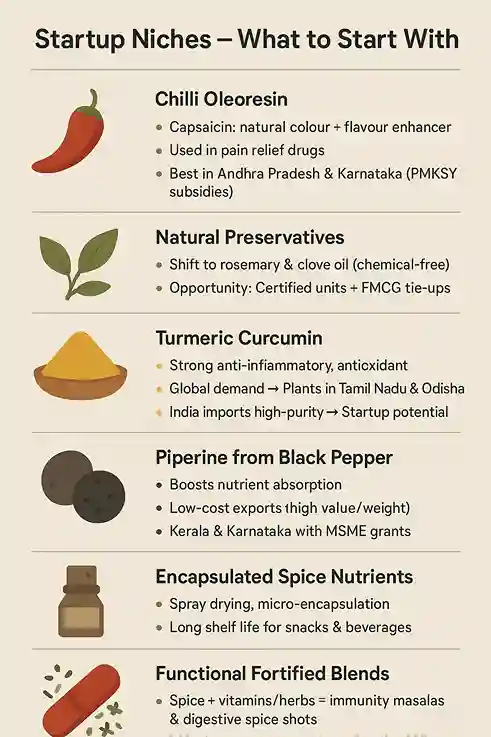India has long been known for its spices. In the past, spices signified aroma and flavor. Now, spices also represent chemistry, health and high-value ingredients.
According to the Spice Annual Report 2023–24, India exported spices worth ₹1.25 trillion. Yet India continues to imports a series of highly-margin products including oleoresins, food ingredients and nutraceuticals.
That void is a golden opportunity for startups. Entrepreneurs can increase their income by processing raw spices into value-added products. Let’s read NPCS’s latest blog to understand the process.
Read More: Biodegradable Products Business: Profitable Eco-Friendly Opportunities in 2025
The Link Between Spices and Chemistry
India exported 15 million tonnes of spices worth ₹1.25 trillion in 2023–24. But a fraction came from value-added products, including oleoresins (concentrated liquid spice extracts), essential oils and extracts. These products are exploding around the world.
They also provide many of us with critical compounds: curcumin from turmeric, capsaicin from chilli and piperine from black pepper. These compounds are sought after for food, medicine and health products.
This demonstrates that the spice is no longer confined just to the culinary context – this has become a chemistry-based commodity and kept for commercial exploitation.
Why Startups Should Care
Start-ups do spice extracts because it is more profitable. Raw drugs can contribute upto 5–10% margins and extraction business can provide 25–50%. India also brings in loads of extracts, so having them produced locally is a money saver and an opening for work.
Meanwhile, Indian government comes in support to this sector via the MoFPI, MSME and APEDA schemes comprising subsidies, technology up-gradation help etc. This is the perfect time for a startup to swoop in.
Manufacturing Business Opportunities in Indian Kitchen Spices
Startup Niches – What to Start With

Chilli oleoresin would be one such alternative. Capsaicin found in chillies is a natural food colour, and flavour enhancer in addition to being used in pain relieving drugs. The southern states of Andhra Pradesh and Karnataka are great places to establish units backed by subsidies under PMKSY.
A second field is natural food additives and preservative. Consumers are moving toward natural preservatives such as rosemary extract and clove oil rather than chemical ones, for example. Startups can establish certified processing units and tie-up with FMCG firms.
Turmeric curcumin supplement is a different niche. Curcumin, an anti-inflammatory and antioxidant ingredient used as nutraceutical. Startups may establish plants in Tamil Nadu and Odisha to focus on global health markets. As long as India continues to import the high-purity curcumin, domestic production holds considerable promise.
Piperine in black pepper is profitable as well. piperine enhances bioavailability of nutrients and drugs. These units can come up in Kerala and Karnataka, where pepper is grown, with help of MSME grants. Because of its value per weight, export costs are low.
Encapsulated spice nutrients are also expanding. Encapsulation stabilizes spice extracts, making them durable enough to be used in snacks and beverages. The most relevant processing techniques are spray drying and micro-encapsulation.
Lastly, functional fortified blends are formed by incorporating spice extracts with vitamins or herbs to produce immunity masalas and digestive spice shots. For Startups, MSME packaging support can be employed for retail as well as B2B products.
Read Our Book: Click Here
Success Stories in India
But there are already plenty of success stories out there, where small startups grow into exporters.
- In Kerala, small oleoresin units turned into global suppliers with the support of MoFPI and APEDA.
- In Gujarat, nutraceutical startups made curcumin and piperine for US firms through MSME grants.
- In Andhra Pradesh, chilli extractors set up capsaicin plants with PMKSY support and exported to European countries.
These stories demonstrate that the right combination of raw material, subsidies and a focus on export can transform a small business into a global supplier.
Import-Export Insights
Chilli, turmeric, cumin, cardamom and pepper are the top 5 spice exports from India. But the steepest growth is in oleoresins, essential oils, compounded blends and nutraceutical extracts.
Meanwhile, India continues to import a lot of high-purity extracts and encapsulated flavors. Which means start-ups should aim for these gaps. By manufacturing world-class products in India, they can cater to local as well as global demand.
Read Our Project Report: Click Here
Action Plan for Entrepreneurs
The first step is to do a pre-feasibility study with help of the experts like NPCS. Secondly, planning to seek subsidies under the PMKSY (Pradhan Mantri Krishi Sinchayee Yojana), MSME (Micro Small and Medium Enterprises) & APEDA and bring cost down.
Next, entrepreneurs need certification routine like FSSAI, HACCP, GMP and Organic to facilitate global standards. Developing farm groups to seed supply chains means high quality and consistent raw material.
Lastly entrepreneurs must go global by attending trade fairs, using online business-to-business (B2B) platforms and implementing a digital-first export approach.
Future Trends
Green extractions methods such as supercritical CO2 will become the norm. The digital traceability of QR codes and blocks chain will prove purity and origin. Spices extracted into other botanical forms ( functional mixing ) will grow strongly in popularity.
In addition, more and more companies are going direct-to-consumer for nutraceutical brands designed for partial sale as they sell through online platforms without intermediary companies.
Find the Best Idea for Yourself With our Startup Selector Tool
Conclusion
India’s spice export industry is already worth rupees 1,250,000,000,000.00, but the opportunity lies not in this case anymore.
Entering oleoresins, curcumin, piperine and natural preservatives is very worthy of consideration for a startup. This has particularly high margins since they are not imported and because brand ownership rests with the seller rather than with anyone else.
Through support from NPCS, entrepreneurs can turn these ancient commodities of India into modern industrial successes.
Oleoresins and Food Additives: FAQs
What’s an oleoresin?
Oleoresins are natural extracts from spices which retain their taste, smell and good health benefits.
Are extracts superior to raw spices?
Extracts make much more money and boast a larger market in the world.
How does the government support this industry?
Through subsidies, export promotion and technology support from MoFPI, MSME and APEDA.
Do startups have to get certifications if they want to export?
Of course. For global recognition, FSSAI, HACCP, GMP, Organic certification are required.
Which spices are best-suited for extracting?
Chili (capsaicin), ginger root (curcumin), black pepper (piperine) cloves and rosemary as a natural preservative.







